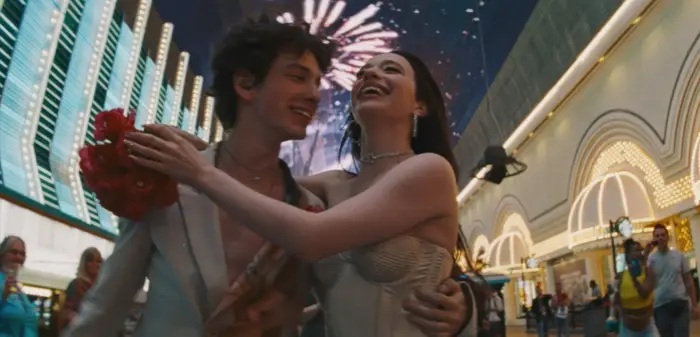
Some films are misinterpreted—not because they are difficult to understand, but because the truth they reveal is too unsettling to acknowledge fully. Anora is one such film. Many critics categorise it as another Pretty Woman-style narrative, a girl-meets-billionaire story that doesn’t unfold as expected. But this is a misreading. Anora is not a story about love, success, or emancipation. It is a film about how we fail to see one another in a world where people only matter if they have something to offer.
By Rafael Baroch
The film follows Anora, a young woman working as an escort in New York. She meets a Russian oligarch who impulsively marries her, pulling her into his world of excess and decadence. This would begin a transformation in another kind of film—the raw talent refined, the poor but clever woman securing her place among the elite. But Anora dismantles this narrative.
The billionaire does not see her. He sees no one. In his world, people are props, accessories, disposable conveniences. The only person who truly sees her is Igor, a Russian from her background, not because he is inherently more empathetic, but because he understands what it means to be invisible.
But the film is more than just a critique of the elite. The social blindness Anora exposes is not exclusive to billionaires. It is universal. You don’t see the hotel maids either. You don’t know the taxi driver, the janitor, the waitress refilling your wine. They exist in the periphery of your vision, relevant only as long as they serve a function. This is not a moral indictment, but an observation. This is how the world operates.
The film touches on a fundamental aspect of neoliberalism: reducing human relationships to economic transactions. Everything is an exchange: service for money, body for protection, love for status. Even in the most intimate interactions, there is calculation and negotiation.
This idea is not new. Karl Marx wrote about commodity fetishism, where the value of products eclipses the people who produce them. In a world that measures everything in terms of utility, the worker disappears behind the finished product. Under neoliberalism, this principle applies not only to goods but to people themselves. Labor, friendship, love, and sexuality are subject to market forces.

Dating apps structure human connection as a marketplace of efficiency, where profiles are assessed based on potential return. Friendships are folded into networks where contacts are strategically leveraged. Even grief and mourning can be capitalised—the right kind of sorrow at the right moment can elevate social status.
Anora understands this logic. She believes she can use her body as a commodity, an investment in a better life. She thinks she knows the rules and can maneuver within them to her advantage. But she makes a crucial mistake. She thinks she is playing the game, when, in fact, she is the game piece. She believes her body is a means, but it is her only capital.
And capital depreciates.
The most unsettling truth in Anora is not that its protagonist is deceived or a victim of misfortune. It is that her entire existence—her choices, desires, and hopes for a better future—is dictated by the fundamental law of the market: you are only free as long as you have something to offer.
In a neoliberal economy, there is no absolute freedom, only functional freedom. You are permitted to participate as long as you possess or are capable. You fall out of the system when you have nothing left to trade. This is not an anomaly, not the tragic fate of a select few, but a mechanism that will eventually claim everyone. The only absolute freedom in this world is worthlessness—the moment when you have become entirely useless, when no one desires anything from you, when you cease to exist.
Anora confronts us with a question rarely asked aloud: Does escape exist? The film rejects the conventional narrative escape route in which characters outsmart their circumstances through cunning or perseverance. Here, there are no rules to bend, no hidden exits. There is only the market, which allows no one to escape.
This is the real tragedy: escape is an illusion. Even those who seem to escape—climb, rise, accumulate power—remain trapped within the value logic. They trade one form of capital for another but are still pieces on the same board. The billionaire who does not see Anora, the escort who positions herself as merchandise, the taxi driver who remains invisible in the rearview mirror—everyone is reduced to what they provide. No one escapes.
The world of Anora is not dystopian. It is precisely as it is. And perhaps that is the most chilling realisation of all.
Anora is not a classical tragedy in which fate seals the protagonist’s doom, nor is it a hero’s journey in which she overcomes her circumstances through wit and resilience. It is a dissection of a system in which people exist only as long as they serve a function. The moment their usefulness expires, they are erased—not through violence or oppression but through sheer indifference.
The janitor who disappears once the floor is clean, the waitress who vanishes once the glass is complete, the escort who becomes invisible the moment the client loses interest—Anora reveals that recognition in our society is not a right, but a temporary concession, entirely dependent on one’s usefulness to others. When you have no more value, you cease to exist.
This is the essence of neoliberalism: it has created a market in which people offer their services and turned us into a market ourselves. Relationships are transactions, social status is a product, and identity is a temporary contract. The free individual has become an entrepreneur, not just of labor but of their existence. And those who can no longer compete are not punished or banished—they are simply no longer seen.
The brutal honesty of Anora lies in its refusal to offer a dystopian warning or a vision of impending collapse. This is not a world in crisis; this is the world. Anora is not the exception; she is the rule.






